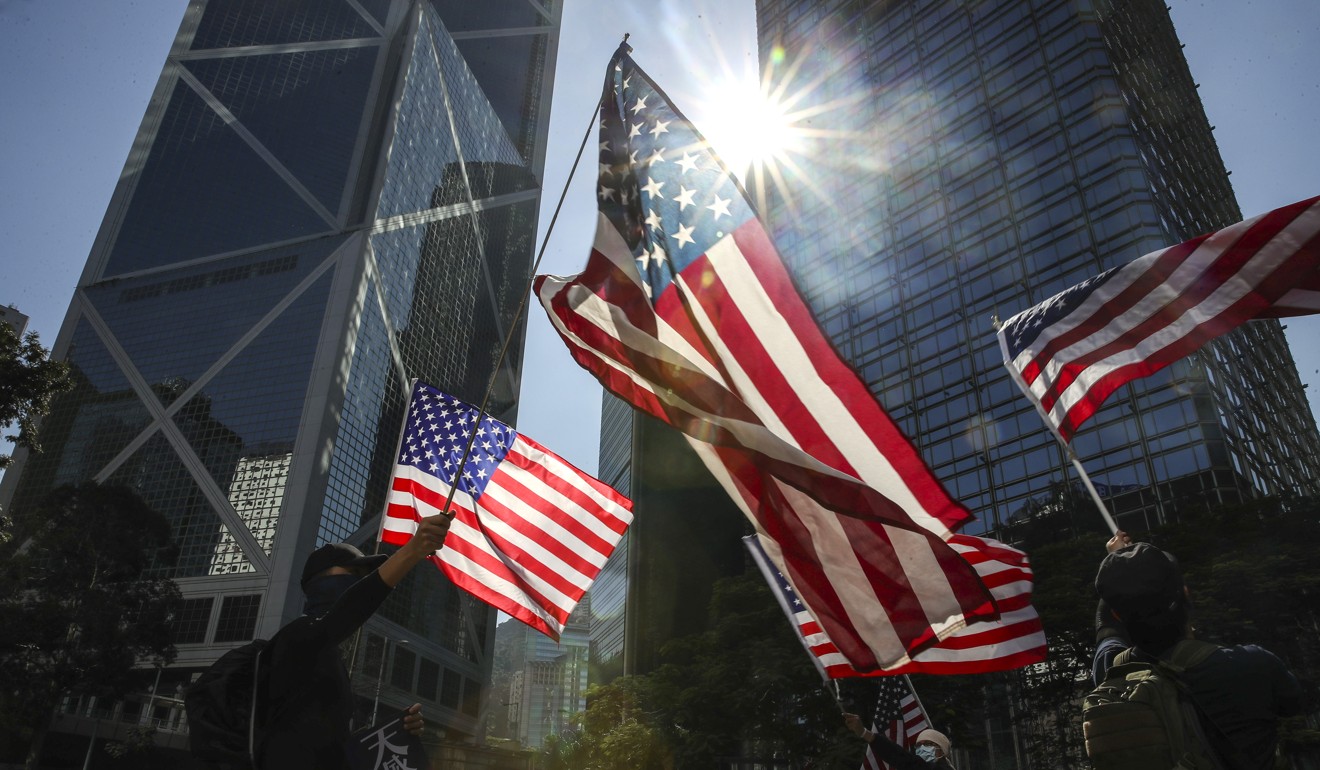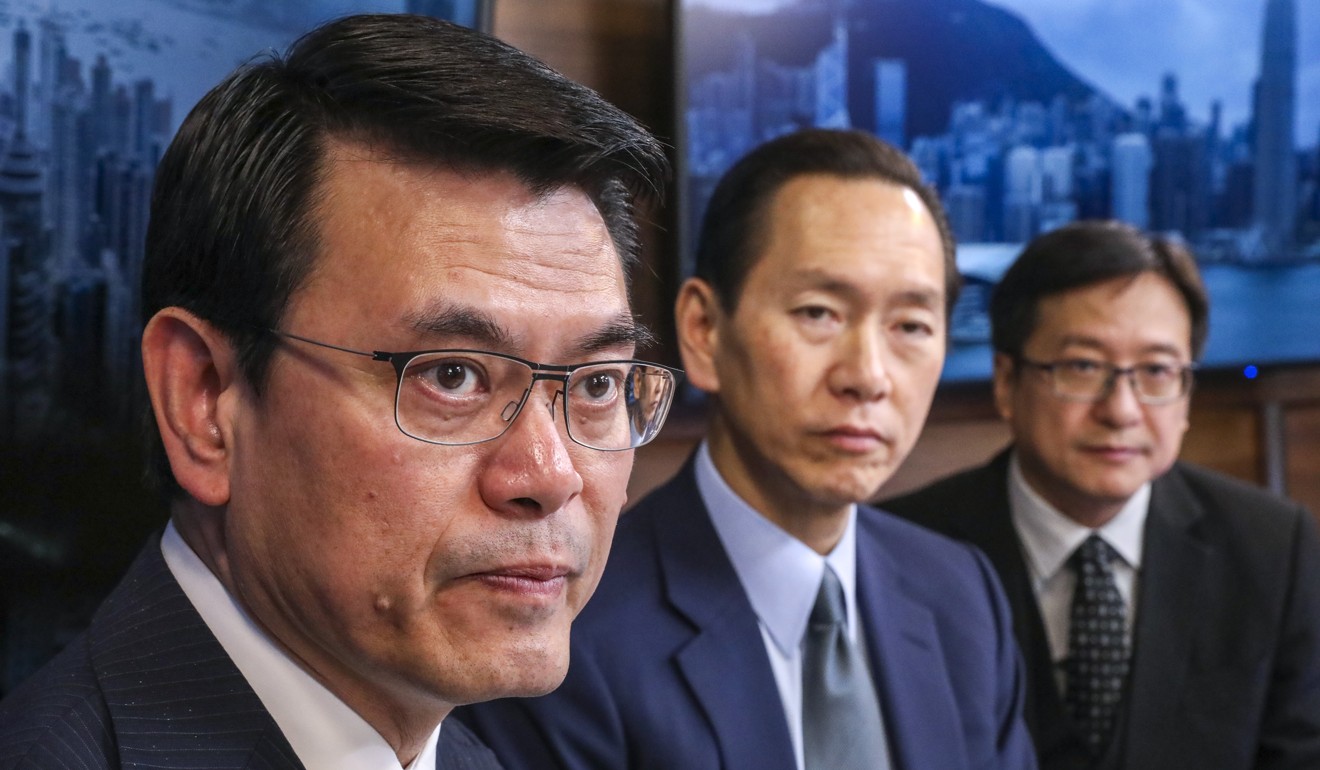Hong Kong faces gloomy and uncertain economic future, say two of city’s senior officials
- Executive Council convenor Bernard Chan says geopolitical events will continue to impact immediate future
- Commerce chief Edward Yau hints at more job losses

Shrinking growth, more job losses, and companies moving their activities elsewhere as social unrest and the US-China trade war continue to take their toll – that is the gloomy prediction for the new year from two of the city’s senior leaders.
In an exclusive interview with the Post, Executive Council convenor Bernard Chan said complex geopolitical issues, including next month’s presidential election in Taiwan, would influence Hong Kong’s immediate economic future.
Speaking in the same interview, Secretary for Commerce and Economic Development Edward Yau Tang-wah said he could see “two cyclones” hitting the city in the unrest at home and the trade war abroad, which had combined to knock 3 per cent off the city’s gross domestic product.
“We are bad, but that is not the end of the world,” Yau said. “One may say we are not yet out of the woods. I can see these two cyclones hitting us – one is the trade war which is easing at least, but the local unrest, we need to tackle it by ourselves; the Hong Kong government and the wider community.”

The anti-government protests that have swept the city since June, combined with the trade war and the passing of the Hong Kong Human Rights and Democracy Act in Washington in November have created an unprecedented sense of unease. President Xi Jinping has called the situation the most critical and complicated since Hong Kong returned to Chinese sovereignty in 1997.
When Chief Executive Carrie Lam Cheng Yuet-ngor travelled to Beijing for her annual duty visit last week, Premier Li Keqiang told her she had to stop the violent protests, and address the deep-rooted conflicts and problems in the city’s socio-economic development.
Chan acknowledged there were several issues that needed to be resolved, not least over housing and the disparity between rich and poor in the city.
“After six months’ unrest, obviously we have a structural issue we need to address,” Chan said. “These are so-called deep-rooted issues that were not dealt with – disparity of housing and affordability.”
I hope people will look at the bigger picture of Hong Kong, even if we don’t agree with each other
The Exco convenor said Lam’s administration also had to address issues surrounding economic and social integration with China.
Latest government statistics showed more than 1.4 million Hongkongers, or one in every five people, were living below the poverty line last year, the highest number in a decade.
The city was ranked the world’s most expensive property market for nine straight years to 2018 by research consultancy Demographia’s International Housing Affordability Survey. Even people wanting to rent a subsidised flat have to wait 5.4 years on average, much longer than the promised three years.
Other issues that needed the government’s urgent attention included divisions within society, Chan said, while he also admitted the broken trust between protesters and police would not be fixed in the short term.
Chan said he still saw online rumours about people dying during a police operation in Prince Edward on August 31, despite those stories being completely unfounded.
“People just do not believe it is fake,” he said. “I don’t know what type of inquiry can resolve that.
“I hope people will look at the bigger picture of Hong Kong, even if we don’t agree with each other. Retail and tourism sectors have been badly affected. If the unrest continues, the downturn will spread to other industries.
“Is this in Hong Kong’s best interests? Can we have some common sense to protect rice bowls?”
With GDP shrinking at its largest level in a decade, Chan said the economic uncertainty could force companies to move their activities elsewhere, while Yau warned more job losses were likely in the months ahead.
Unemployment in tourism-related industries hit a three-year high of 5.2 per cent in the three months to November. The jobless rate in the food and drink sector jumped to 6.2 per cent from September to November, the highest in more than eight years.

Asked if Hong Kong’s economic outlook could be worse than during the outbreak of the severe acute respiratory syndrome (Sars) epidemic in 2003, Yau said Hong Kong had “to soldier on”.
But the commerce minister said it was not all bad news, and pointed to Thailand and other Asean countries – Indonesia, Singapore, Malaysia, Vietnam, the Philippines, Cambodia, Brunei, Myanmar and Laos – as areas of opportunity for growth.
The trade bloc and Hong Kong signed a free-trade deal in 2017.
“Thailand used to export fragrant rice to Hong Kong. Now they have US$30 billion worth of direct investments in the city, which means it needs our management services,” Yau said. “The country is also known for film post-production.”
Last month, Hong Kong and Thailand reached a consensus to collaborate over bilateral trade and investments, the mutual recognition of securities trading and green finance via respective stock exchanges, creative industries, manufacturing, technology development, human resources development and academic exchanges.
Law Society vice-president Chan Chak-ming said Hong Kong’s strength in the rule of law positioned it as an arbitration centre as Asean members and former British colonies such as Brunei and Myanmar’s legal systems are based on common law.
“We have challenges now, but it is also the best opportunity to tell the world that our rule of law is still robust,” he said.